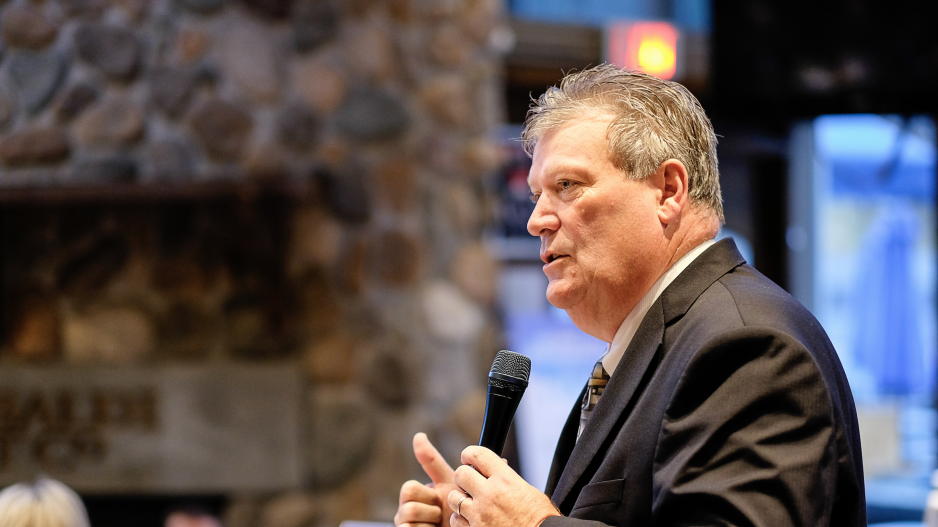A BC Supreme Court judge has ordered that former forests and range minister Rich Coleman be examined under oath about his knowledge of events at the centre of a multimillion-dollar, multi-year legal battle between TimberWest Forest Corp. and former contractor Ted LeRoy Trucking Ltd. (TLT).
Plaintiffs Ted and Rebecca LeRoy are suing TimberWest and several of its former executives over what they claim was a conspiracy to bankrupt TLT and terminate their logging contracts so that TimberWest could subdivide that work among smaller operators and ultimately reduce its timber-harvesting costs.
The plaintiffs’ lawyer successfully argued that Coleman, who was minister at the time TLT declared bankruptcy in 2007, would have knowledge of TimberWest’s financial state and its plan to subdivide work.
Coleman’s examination later this summer is expected to shed light on his knowledge of and alleged involvement in the sale of publicly traded TimberWest to two Canadian pension funds while he was acting as the minister responsible for overseeing forestry issues in British Columbia.
A lawyer representing Coleman has argued that the two pieces of evidence that relate to the former minister – a handwritten note that reads “Rich Coleman initiative” and an email between Coleman and Paul McElligott, TimberWest’s former president and CEO – are not evidence of Coleman’s involvement in TimberWest’s sale.
In 2008, court documents confirm, TimberWest entered into a $100 million debenture purchase agreement with two subsidiaries of the British Columbia Investment Management Fund, now the British Columbia Investment Management Corp. (BCI). This followed a “very challenging” time for the company, which was grappling with market conditions and labour unrest, among other issues.
In 2011, TimberWest was acquired by BCI and the Public Sector Pension Investment Board (PSP Investments) for more than $1 billion in cash.
Lawyers for the defendants have argued that any involvement Coleman had in TimberWest affairs was “predicated upon unfounded assumption and speculation.” They unsuccessfully argued to have Coleman’s examination restricted.
The defendants have also repeatedly denied all allegations of fraud, deceit, defamation and conspiracy brought forward in the LeRoys’ lawsuit, which was launched in December 2013.
The firm representing TimberWest and its former executives declined to comment on the matter.
TimberWest is Western Canada’s largest private timberland company, and more than a decade ago, TLT was one of its major contractors.
Prior to its financial challenges, TLT had 530 employees and annual revenues of $70 million, approximately 72% of which came from its seven Vancouver Island logging, harvesting and road-building contracts with TimberWest, according to legal documents.
The plaintiffs allege that TimberWest denied permitted work under these contracts, misrepresented the value of one contract in particular and interfered with a $12 million loan TLT secured from the Royal Bank of Canada in order to purchase equipment from TimberWest.
They argue that, as a result, the loan was recalled and TLT forced into bankruptcy.
Both TLT and TimberWest later agreed to terminate all contracts, and the latter paid TLT $3 million. However, Ted LeRoy claims he was unaware at the time that, in his view, TimberWest wanted to bankrupt his company.
No trial date had been confirmed by Business in Vancouver’s production deadline.
In a separate but related lawsuit between TimberWest and Munns Lumber Ltd., a judge ruled that TimberWest had breached its contractual obligation to negotiate in good faith when it terminated two five-year contracts with Munns after the companies failed to agree on logging rates. Munns went bankrupt and claimed TimberWest had failed to negotiate in good faith “with the intent to orchestrate the termination of contracts as part of a plan to pursue subdivision of their logging contracts into smaller, less expensive, contracts.”
Damages of $2.75 million were awarded to the plaintiffs over the contract breach. The court rejected the allegation that TimberWest had fraudulently misrepresented its ultimate intention to subdivide its logging contracts.
Throughout the company’s four-and-a-half-year legal battle with TLT, TimberWest has maintained that it was transparent about its subdivision plans and that it has worked with its contractors in good faith.
The plaintiffs are seeking over $150 million in damages or to have TimberWest pay back profits generated as a result of the alleged conspiracy – a sum the plaintiffs claim to be around $957 million. •




